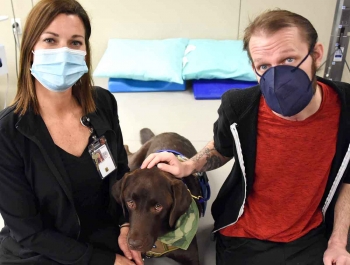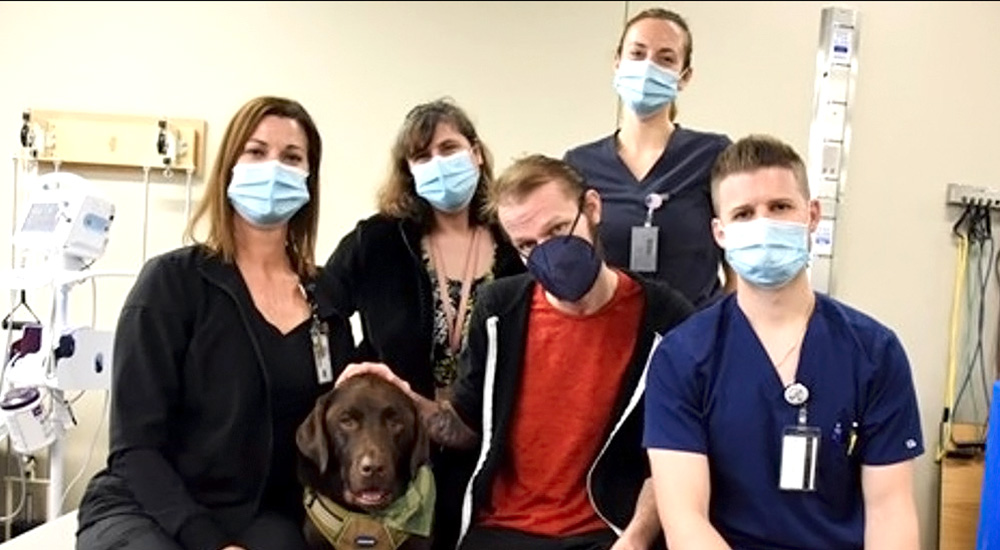When a Veteran or service member experiences a traumatic brain injury (TBI), they are often cared for by the VA Polytrauma Team. Army Veteran Andy Anderson is a patient receiving care from the team at the Southeast Louisiana Veterans Health Care System in New Orleans.
A TBI is a life-changing event that takes time and patience to recover from. After suffering a TBI due to a car crash on July 18, 2021, life would never be the same for Anderson.
“I don’t remember much about the accident, but it was really bad and I was hit really hard,” said Anderson. He recalls being told he was unconscious for several days after the car crash.
Veterans who experience a TBI deal with many obstacles, such as relearning how to perform daily tasks like walking and talking. No matter the severity of a TBI, the Southeast Louisiana VA Polytrauma Program is here to support Veterans through their rehabilitation journey.
Receiving personalized care from clinical team
The polytrauma program has a clinical team that provides personalized patient care to Veterans with TBI and other trauma-related injuries. Anderson is currently receiving care from the polytrauma team, including physical medicine and rehabilitation, neurology, psychology and physical therapy. He is also receiving care in occupational therapy, speech therapy, social work, case management, music therapy and animal-assisted intervention.

“It is my hope that Andy and Dante’s story will promote awareness of TBI and the programs we offer here at VA,” said Natalie Pilie, physical therapist and neurologic clinical specialist.
One of the newest components of the polytrauma program is the facility dog program. Dante, the facility dog, is used in therapy to improve patients’ gait, balance, range of motion, strength, coordination, cognition and participation.
Dante has been fully trained by and belongs to United States Veterans Service Dog Organization in Covington, Louisiana. Natalie Pilie, physical therapist and neurologic clinical specialist, is his primary handler.
The prosthetics department used its 3D printer to create patches on Dante’s vest and other therapy interactive tools for Anderson to use with Dante during different rehabilitation exercises. The patches they created say “Please Pet Me” with a paw print and “Serving Those who Served” with a silhouette of a Veteran with a canine beside him.
“I’m able to do all those things again.”
The interactive therapeutic tool is a spinning wheel used in therapy to focus on improving fine motor skills, visual scanning cognition, comprehension and motor execution.
“It sucked not being able to run, jump or even have balance because of my injuries. But because of Dante, I’m able to do all those things again,” said Anderson.
“Dante is my buddy and I love him.”
Each day is different when dealing with a traumatic brain injury. Anderson still has trouble remembering things and the names of members on his polytrauma team who have helped him for months. However, he met Dante once and remembered his name right away.
When asked how Dante has helped him during his recovery, Anderson said it reminded him of “Growing up as a kid in the countryside running with my dog. Dante is my buddy and I love him. He motivates me to get better.”
“I’m proud of the progress Andy has made thus far,” said Pilie. “It is my hope that Andy and Dante’s story will promote awareness of TBI and the programs we offer here at VA. The addition of animal-assisted therapy has had a positive impact on Andy’s progress because of his interaction with Dante and the bond they have. I can’t wait to see Andy continue to grow throughout his rehabilitation.”
Learn more at www.polytrauma.va.gov.
Topics in this story
More Stories
Veteran was trained to collaborate with fellow Airmen. Having his buddy’s six was important, and still is.
It’s essential for Veterans to take action and prepare for tornados and spring storms while staying informed.
Army Veteran Jeffery Williams' journey is a testament to resilience, perseverance and the power of innovation in transforming lives.





